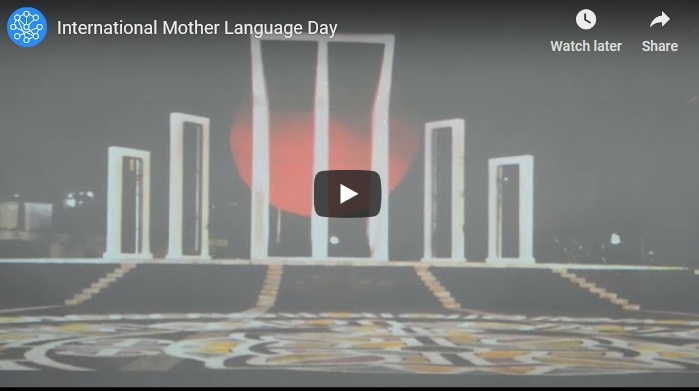International Mother Language Day (IMLD) is a worldwide annual observance held on 21st February to promote awareness of linguistic and cultural diversity and promote multilingualism. It was first announced by UNESCO on 17th November 1999 and formally recognized by the United Nations General Assembly in a resolution establishing 2008 as the International year of languages. For the Indians, especially for the Bengali speaking regions it is a day of immense importance as it reminds us of the 21st February 1952 Bengali Language Movement Demonstration.
At St. Lawrence High School, the Bengali Club organised a cultural programme to pay respect to the sacrifice of Bangladeshi patriots who fought for the recognition of the Bangla language. The students of ninth and tenth grade made the model of the Shaheed Minar or the Martyr Monument that exists in Dhaka, Bangladesh. It was kept on display and before the programme began, the students kept flower offerings before the model as a sign of deepest love and respect for the patriots who had lost their lives in the Language Movement.
The entire programme was conducted in Bengali language to bring to memory the importance of the noble sacrifice. At first a student narrated the history of the Language Movement of 1952, followed by an explanation of the model represented. The design included a half circular arrangement of columns to symbolize the mother, with her fallen sons, standing on the monument’s central dais and the rend sun shining behind as a symbol of a new awakening. The basement of the actual monument in Dhaka has a 1500 square foot mural representing the history of the Language Movement. The Bengali choir of St. Lawrence High School then proceeded to sing the melodious verses of the famous song Amar Bhaier Rogte Rangano Ekushey February (My Brothers’ Blood Spattered on 21st February) originally written by Abdul Gaffar Chowdhury and composed by Abdul Latif. Later, Altaf Mahmud, a renowned composer and a martyr of the Bangladeshi Liberation War, recomposed the song which is now a quasi-official tune. The song was accompanied by the tunes of the guitar which made alive the gruesome history of the Language Movement in our minds.
The entire programme was witnessed without any form of clapping or applause as a symbol of a day of mourning. The programme took place in the Wavreil Hall in the presence of students, teachers, Father Principal and Father Vice Principal. It was an enlightening experience as it has been truly said that a people without the knowledge of their past history, origin and culture is like a tree without roots. It is in our roots wherein lies the promise of a stronger and greater tomorrow.
Inicia sesión o Hazte miembro
para crear y ver comentarios


